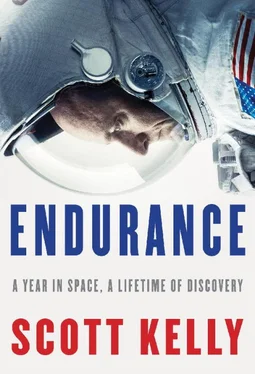15

October 28, 2015
Dreamed Kjell and I were going to go skydiving together. We went up in a plane, and as I was standing near the doorway Kjell jumped out without his parachute. I watched his face change as he realized his mistake, a look of horror overtaking him as he slowly fell away from me. I didn’t have my own parachute on yet, so I was scrambling around looking for one so I could jump out and catch Kjell before he could hit the ground. I searched frantically through piles of junk in the plane. After a while I knew it must be too late, but I kept looking anyway until I woke up.
I’M FLOATING in the U.S. airlock, wearing a 250-pound spacesuit, while the air is slowly pumped out. I can’t see Kjell’s face because we are crammed into a space the size of a compact car, at odd angles, his head down near my feet. I’ve been in the suit for four hours now. Kjell is wearing the only extra-large spacesuit on station because he couldn’t fit into the large-sized one, so I’m wearing a suit that’s clearly too small for me, feeling like ten pounds of potatoes stuffed into a five-pound bag. I’m already tired and sore.
“How you doing, Kjell?” I ask, staring directly at his boots.
“Great,” Kjell says and gives a quick thumbs-up I can barely see through the bottom of my visor. Any normal person, upon experiencing the air leaving the airlock around him, would be somewhere on the scale between apprehensive and terrified. But Kjell and I have trained for this, our first spacewalk, for a long time, and we feel prepared and confident in the equipment and the people who are keeping us safe.
Suddenly a series of loud bangs reverberates through the airlock, a sound I’ve never heard in training. It’s like someone knocking on a door loudly and urgently. Then it’s quiet. Has something gone wrong? Should we be doing something? I mention the sound to the ground, and they tell me that it’s normal, one of the things that happens when the air is sucked out of the airlock. No one thought to tell us about it in training, or maybe they just forgot to mention it, or maybe they did and I forgot. I’ve practiced this moment many times, wearing a spacesuit and being lowered into a giant swimming pool containing an ISS mock-up at JSC, but it’s different doing it for real, in space, with no safety divers to help us out if things go wrong.
Once the airlock is nearly at vacuum, Kjell and I do a series of checks on our spacesuits to make sure they are not leaking. This process consists of a series of switch throws and slides of a lever, all of which are extremely difficult to do while wearing the suit’s gloves, sort of like trying to change a car’s tires while wearing a baseball glove. To make things worse, we can’t see the controls, so we have to use mirrors attached to our wrists to see what we are doing (the labels on the controls are written backward so we can read them).
Looking ahead at the procedures, I see that once the airlock is down to a complete vacuum, each of us will turn our water switch on, which will allow water to flow through the cooling system to control the temperature in our suits. We can’t do this prematurely because the water can then freeze and crack the lines. As the air continues to escape the airlock, I consider warning Kjell that the water switch is easy to flip accidentally. It’s right next to a similar-looking switch that we use often to silence alarms or scroll through lines of status messages on a small LCD screen. But I tell myself that Kjell is as well trained as I am for this spacewalk. I’m not going to micromanage him.
When the airlock is not quite at a vacuum, Kjell says, “Houston—and Scott—I just hit my water switch on/off.”
Shit! I think, but don’t say. I take a breath to steady myself. “You cycled it?” I ask. He’s just done the very thing I decided against warning him about.
“Yeah.”
Our capcom for the spacewalk is Tracy Caldwell Dyson, my crewmate from my second shuttle flight—she gained a new last name through marriage in the intervening time. “Houston copies,” Tracy responds. “Kjell, can you tell us how long it was on?”
“Less than half a second,” Kjell says. He sounds dejected. We’ve already spent hours today—and entire working days over the past two weeks—getting ready for this spacewalk. We do not want to have to start all over, not to mention the possibility of damaging the $12 million suit.
While spacesuit experts on Earth confer about how to proceed, I’m pissed at myself for not warning Kjell. Knowing the way NASA works, we are aware there is a very good chance they will not allow us to continue. If that happens, it will be because the experts cannot guarantee Kjell’s safety, and the most important thing is that we both finish the day alive. On the off chance NASA will let us continue, I need Kjell to keep his head in the game.
“It’s happened before, Kjell,” I tell him. “It’ll happen again.”
“Yeah,” Kjell answers, sounding dispirited.
“Don’t worry about it,” I say, wishing I could make eye contact to see how he’s doing.
“No worries,” Kjell replies in a flat tone completely at odds with his words. Astronauts have seen their careers permanently affected by mistakes like this.
“It’ll be all right,” I say, talking to myself as much as I’m talking to him now.
Suit experts on the ground are still discussing whether to proceed, and what precautions we’ll need to take. Meanwhile, we are told we can open the hatch and enjoy the view while they decide on a course of action. As I put my hand on the handle, I realize that I have no idea whether it will be day or night outside. I unlock the hatch handle and crank it, releasing the “dogs.” Now I have to simultaneously translate the hatch toward my chest and rotate it toward my head, which is challenging, because with nothing to hook my feet onto, I’m pulling myself toward the hatch almost as much as I’m pulling it toward me.
I tug and push and pull for a few minutes, and finally the hatch cracks open. The reflected light of Earth rushes in with the most abrupt and shocking clarity and brightness I’ve ever seen. On Earth, we look at everything through the filter of the atmosphere, which dulls the light, but here, in the emptiness of space, the sun’s light is white-hot and brilliant. The bright sunshine bouncing off the Earth is overwhelming. I’ve just gone from grunting in annoyance at a piece of machinery to staring in awe at the most beautiful view I’ve ever seen.
Inside my spacesuit, I feel like I’m in a tiny spacecraft rather than wearing something. My upper body floats inside the hard torso, my head encased in the helmet. I hear the comforting humming noise of the fan moving the air around inside my suit. The helmet has a faint chemical smell, not unpleasant, perhaps the anti-fog solution our visors are treated with. Through the earpiece built into my comm cap, I can hear the voices of Tracy in Houston and Kjell just a few feet away from me out here in outer space—that, and the strangely amplified sound of my own breathing.
The surface of the planet is 250 miles below my face and whizzing by at 17,500 miles per hour. It takes the ground about ten minutes to tell Kjell and me to go outside the hatch, where we can move around better, so I can check over Kjell’s suit for a leak. In the cold of space, a leak would look like snow shooting out of the backpack of the suit. If I don’t see snowflakes, we may be allowed to continue.
I grab both the handrails on either side of my head, getting ready to pull myself out. The airlock’s hatch faces the Earth, which would seem to be the direction we would call “down.” When we trained in the pool, the hatch was facing toward the floor, which always felt like down. Though I was neutrally buoyant in the pool, gravity still forced me toward the center of the Earth, providing a clear sense of up and down. For the hundreds of hours we practiced for this spacewalk, I got used to the idea of this configuration.
Читать дальше













